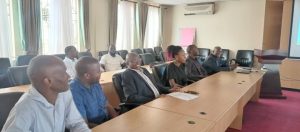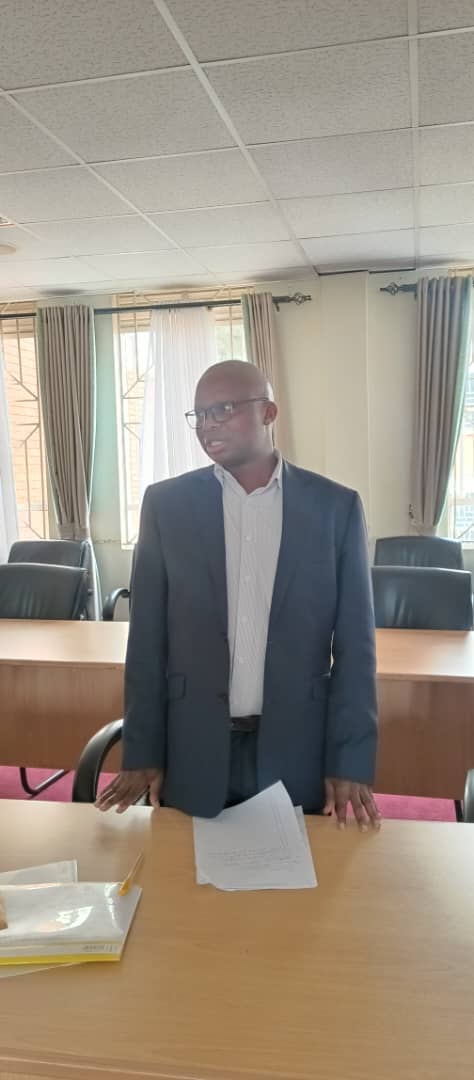Makerere University’s School of Statistics and Planning (SSP) recently hosted a three-day workshop on sustainable electronic waste (e-waste) management, led by a team from the East African Community (EAC). The workshop, which is part of a broader initiative to enhance environmental management practices across the East African region, was aimed at retooling university staff on the best practices for handling and disposing of e-waste.
The workshop was officially opened by Prof. James Wokadala, the Deputy Principal of the College of Business and Management Sciences and Dean of the School of Statistics and Planning. In his opening remarks, Prof. Wokadala expressed his gratitude to the EAC team, led by Mr. Dismas Mwikila, for the critical knowledge shared with Makerere University staff. He highlighted the importance of e-waste management, emphasizing that the public needs to be well-informed about the proper ways to dispose of electronic waste.

“E-waste is becoming a growing concern as more electronic devices are being used and discarded. Without proper disposal methods, hazardous substances like lead, mercury, and cadmium, often found in electronic equipment, can cause significant harm to both human health and the environment,” said Prof. Wokadala. He underscored that this training comes at a crucial time, as Uganda and the broader East African region are seeing an increase in the use of electronic devices. He also expressed his hope that similar training workshops would be scaled up to other colleges within the university to ensure comprehensive coverage of this critical issue.
The workshop forms part of the EAC’s Electronic Waste Management Plan (E-Waste MP), which was developed to address the growing challenge of electronic waste across its member states, including Uganda, Kenya, Tanzania, Rwanda, Burundi, South Sudan, and the Democratic Republic of Congo (DRC). According to the EAC’s environmental and social commitment plan, managing e-waste is crucial not only for protecting the environment but also for safeguarding human health. In line with this, the EAC emphasizes the importance of adopting sustainable e-waste management practices, such as recycling and proper disposal, which help to mitigate the harmful effects of toxic materials found in electronic products
The workshop covered the best practices for the disposal of these items, including recycling and recovery techniques that can be used to extract valuable materials from discarded electronic devices. This ensures that fewer toxic substances are released into the environment, and valuable resources are recovered for reuse.
Prof. Wokadala further appreciated the EAC’s generous support to Makerere University’s School of Statistics and Planning, noting that the school recently received 160 computers, laptops, printers, and other ICT equipment worth $0.5 million from the EAC. This donation is expected to enhance the school’s technological capabilities, further supporting the institution’s mission to provide high-quality education and research in the field of statistics and planning. Additionally, the EAC has provided funding to facilitate staff training in Data Analytics, a critical area for the future of research and decision-making in the digital age.
The Mr. George Magala, from the Ministry of EAC Affairs Uganda, also highlighted the importance of sustainable e-waste management practices not only in educational institutions but also across all sectors of the economy.
Mr. Mwikila explained that e-waste is one of the fastest-growing waste streams in the world, growing at a rate of 3-5% per year. This growth is driven by the increasing use of electronic devices, coupled with their shorter life cycles. He noted that without sustainable e-waste management practices, countries in the East African region risk facing significant environmental and health challenges. Proper e-waste management not only reduces the harmful impacts on the environment but also provides economic opportunities through the recovery of valuable materials such as copper, aluminum, and gold from discarded electronics
The workshop concluded with a call to action for universities and other institutions in Uganda and the wider East African region to adopt sustainable e-waste management practices. The EAC reiterated its commitment to providing technical assistance and capacity-building initiatives to help institutions manage e-waste in a responsible and sustainable manner.
This initiative demonstrates Makerere University’s ongoing efforts to align itself with global best practices in environmental management, further positioning itself as a leader in sustainable development in the region. By equipping its staff with the necessary skills to manage e-waste, the university is taking a proactive step in addressing one of the most pressing environmental challenges of the digital age.
The three-day workshop represents an important milestone in Makerere University’s collaboration with the EAC, and it is expected to have a lasting impact on the university’s ability to manage electronic waste sustainably.

